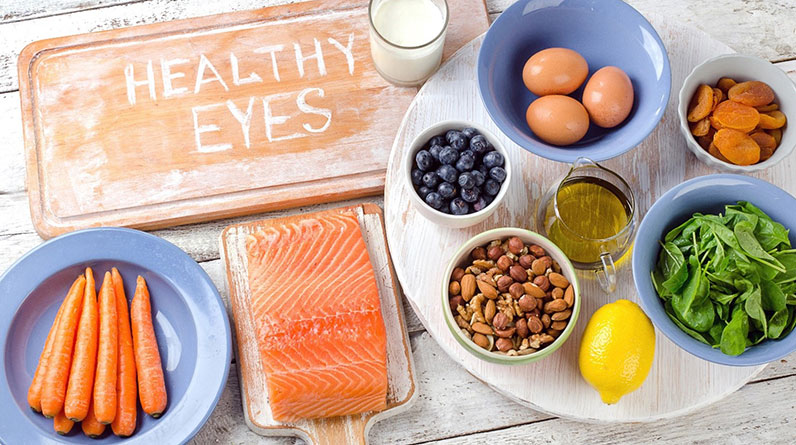
Key Nutrients for Optimal Eye Health
Proper nutrition is key to maintaining eye health and protecting vision as we age. Certain nutrients have been shown to support eye function and help prevent common eye conditions such as macular degeneration and cataracts. Here are five key nutrients essential for optimal eye health:
1. Vitamin A
Vitamin A is one of the most important nutrients for maintaining healthy vision. It is important in the creation of rhodopsin, a pigment found in the retina that helps us see in low-light conditions.
- Benefits: Vitamin A supports overall eye health by preventing dry eyes and night blindness, and it also contributes to maintaining a clear cornea, the outer covering of the eye.
- Sources: Good sources of Vitamin A include carrots, sweet potatoes, spinach, kale, and liver.
2. Vitamin C
Vitamin C, a powerful antioxidant, is essential for protecting the eyes from damage caused by free radicals. This nutrient helps maintain the health of blood vessels in the eyes and reduces the risk of cataracts.
- Benefits: Vitamin C helps lower the risk of developing cataracts and, when combined with other antioxidants, can slow the progression of age-related macular degeneration (AMD).
- Sources: Citrus fruits like oranges and grapefruit, as well as strawberries, bell peppers, and broccoli, are excellent sources of Vitamin C.
3. Vitamin E
Vitamin E is another potent antioxidant that plays a protective role in eye health. It helps defend cells in the eyes from oxidative stress, which can contribute to the development of cataracts and AMD.
- Benefits: Vitamin E helps reduce the risk of cataracts and slows the progression of AMD by protecting cells from free radical damage.
- Sources: Nuts, seeds (especially almonds and sunflower seeds), and vegetable oils are rich sources of Vitamin E.
4. Omega-3 Fatty Acids
Omega-3 fatty acids, particularly docosahexaenoic acid (DHA) and eicosapentaenoic acid (EPA) are essential for maintaining the health of the retina and preventing dry eye syndrome.
- Benefits: Omega-3s play a key role in reducing eye inflammation, supporting retinal function, and maintaining eye moisture to prevent dry eye syndrome.
- Sources: Fatty fish like salmon, mackerel, and sardines are excellent sources of Omega-3s. Plant-based sources include flaxseeds, chia seeds, and walnuts.
5. Zinc
Zinc is an important mineral that helps transport Vitamin A from the liver to the retina to produce melanin, a protective pigment in the eyes. Zinc is also important for the maintenance of the retina and helps slow the progression of AMD.
- Benefits: Zinc supports overall eye health, helps protect against night blindness, and may reduce the risk of developing advanced AMD.
- Sources: Oysters, beef, pumpkin seeds, and legumes are rich in zinc.
Diet and Lifestyle Tips for Healthy Eyes
Maintaining healthy eyes goes beyond simply consuming the right nutrients. A well-rounded approach that includes a balanced diet, proper hydration, and healthy lifestyle habits can significantly contribute to long-term eye health. Here are some key tips to keep your eyes healthy:
1. Eat a Balanced Diet
A diet rich in a variety of nutrients is essential for optimal eye health. Incorporating foods that provide essential vitamins, minerals, and antioxidants can help protect your eyes from age-related conditions and maintain overall vision health.
- Tip: Focus on including leafy greens (like spinach and kale), colorful vegetables (like carrots and bell peppers), and fatty fish (like salmon and sardines) to ensure you’re getting a range of nutrients like Vitamin A, Vitamin C, Vitamin E, Omega-3s, and Zinc. A diet that is well-balanced in nutrients can help prevent common eye problems like cataracts, macular degeneration, and dry eyes.
2. Stay Hydrated
Proper hydration helps to maintain the moisture levels in your eyes and prevent dryness and irritation. Dehydration can lead to dry eyes, discomfort, and even blurry vision.
- Tip: Make sure to drink plenty of water throughout the day to support the natural lubrication of your eyes. Staying hydrated helps prevent dry eye syndrome, especially if you spend long hours in air-conditioned or heated environments, which can dry out your eyes.
3. Limit Sugar and Processed Foods
High levels of sugar and processed foods in your diet can increase the risk of developing diabetes and other health conditions that can negatively impact your eyes. Diabetic retinopathy, for example, is a condition that can cause severe vision loss in people with uncontrolled blood sugar levels.
- Tip: To protect your eye health, limit your intake of sugary foods and refined carbohydrates, which can cause blood sugar spikes. Instead, focus on whole grains, lean proteins, and healthy fats. These foods can help regulate blood sugar and reduce your risk of eye-related complications from diabetes.
4. Seek Regular Eye Check-Ups
Regular eye exams are essential for early detection of any potential issues that could affect your vision. Many eye conditions, such as glaucoma and age-related macular degeneration, often develop without noticeable symptoms in the early stages. Regular check-ups can help catch these problems early when they are most treatable.
- Tip: Schedule comprehensive eye exams at least once a year, especially if you are over the age of 40 or have a family history of eye disease. Eye exams not only check your vision but can also detect other health issues, such as high blood pressure and diabetes, which can affect eye health.
Maintaining healthy eyes requires more than just eating nutrient-rich foods—it involves a holistic approach that includes proper hydration, limiting sugar and processed foods, and making regular eye check-ups a priority.
Incorporating foods rich in the nutrients discussed into your diet can help preserve your sight and reduce the risk of common eye conditions as you age.
